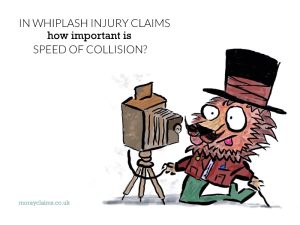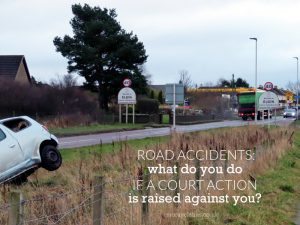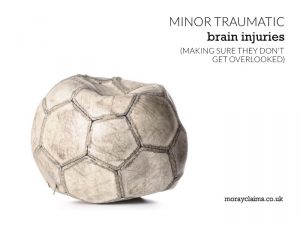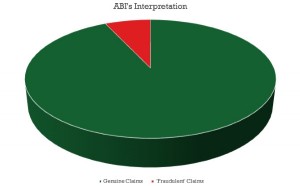By definition, whiplash injuries are caused by low velocity impacts. The perpetual difficulty we have in describing whiplash injuries stems from the fact that there is, by definition, no structural pathology (i.e. nothing that can be independently verified by x-rays or other scans) They say that whiplash-associated disorders remain 'a diagnosis of exclusion'. In other words, if you seem to be dealing with 'appropriate' symptoms and nothing else would explain them, "whiplash" is your diagnosis because you have excluded all other possibilities. What is the mechanism of a whiplash injury? The mechanism of a whiplash injury involves the initial acceleration of the vehicle occupant due to force being transmitted through the vehicle in which they are seated - typically, a rear-end shunt of their vehicle. This results in the occupant to moving forward. In moving forward, the occupant’s head and upper cervical spine (neck) lags behind very slightly compared to the movement Continue Reading
Whiplash Claim in Scotland? Make sure you apply the right rules
In Scotland, we are used to being lumped in with England and other parts of the UK in all sorts of situations where that may be misleading or even wrong. Sometimes the law is the same in Scotland as in the rest of the UK and sometimes it’s not. Personal injury claims are usually based upon negligence of one person causing injury to another. The modern law of negligence for the UK (and much of the world) is based on the Scottish “snail in the ginger beer bottle” case of Donoghue –v- Stevenson. But some areas of personal injury law differ markedly between the jurisdictions. For example, the law relating to claims in cases of fatal accidents and payment of bereavement damages to relatives of deceased persons. Scotland has had a more ‘generous’ compensation scheme in this type of case than the rest of the UK for a long time. But one area where there has been a parting of the ways between Scotland, on the one hand, and England and Wales, on the other, has come as recently as May Continue Reading
Road Accidents: What To Do If A Court Action Is Raised Against You
We regularly get enquiries from people who have had a court action raised against them following involvement in a road traffic accident. If you are in that situation, what should you do? The typical scenario runs like this … You’ve had an accident with another vehicle when you were driving your car. The accident was your fault. The other vehicle was damaged or written off and the other driver was injured. Hopefully, you had comprehensive insurance and so your own vehicle will have been repaired or replaced by your insurers. They may also have told you they have settled the other party’s claim – by paying for the repair or replacement of their vehicle. Months later, out of the blue, you receive an Initial Writ or Summons (depending on whether the action against you is in the Sheriff Court or the Court of Session). This can be a startling experience, especially if the action is served on you by a Sheriff Officer or Messengers at Arms. The other driver – or maybe a passenger in that Continue Reading
4 ways to avoid problems with your whiplash injury claim (that your solicitor can’t really tell you about)
Whiplash injuries are problematic because they are soft tissue injuries. They cannot be identified or confirmed on any form of medical scan. They can be difficult to diagnose. Because of this, they are controversial injuries. They can be exaggerated. It is said that they can even be faked. In May 2018, the insurer Aviva reported that the value and volume of fraudulent claims detected by them had increased for the second consecutive year. Aviva said it now rejected around one in eight whiplash claims because they were suspect or considered to be fraudulent. Putting the case for personal injury victims, on the other hand, the Association of Personal Injury Lawyers (APIL) pointed out that on the Association of British Insurers' own figures, only 0.17% of all motor claims are proven to be fraudulent. Motor claims include property claims due to fire, theft and damage, as well as personal injury. In other words, not all motor claims involve a personal injury element, so only a Continue Reading
Compensation for Subtle Brain Injuries
One of the most outstanding English football centre forwards of the 20th Century tells of how, in February 1941, he received his call-up papers to the Royal Air Force. After his basic training, he passed on to the course set for a wireless-operator air-gunner. His training took him to numerous places across England. Finally, he was posted to Moray where he was to have an accident which could easily (at best) have ended his footballing career before it had even begun. He takes up the story in his 1949 autobiography, “Football Is My Game”. “It was while I was at Lossiemouth that I met with the accident which nipped my “career” as a W/op.A.G. in the bud, and prevented me from being sent abroad. We were on operational training; the Wellington (bomber aeroplane) caught fire, and down we went in a dive. We finished in a fir plantation. The pilot and bomb-aimer were killed. The navigator lost a leg. I got out alive with various injuries of which the worst was a head wound Continue Reading
Removing Right To Claim For Whiplash Injury Is Thin End Of The Wedge
As a bus passenger most days between Lossiemouth and Elgin, the recent unreliability of the Stagecoach service has been a regular topic of conversation. It has made me wonder how you can give an incentive to provide on-time servicing to a company with a virtual monopoly of the local bus service. How about we all get the automatic right to claim compensation from Stagecoach for our hassle and inconvenience every time a bus is more than 15 minutes late? An end to compensation for minor whiplash In his Autumn Statement for 2015, the Chancellor announced that the Westminster government intends to introduce measures to end the right to compensation for minor whiplash injuries. (We don't know yet how 'minor' is to be defined). Scotland not included Our understanding is that these proposed reforms would apply only to England and Wales (and not Scotland or Northern Ireland). However, we’re highlighting these proposals because we consider the principle to be so important. The Continue Reading
Insurers Not Getting In Touch After An RTA (Why That Might Be)
How long does it take for Insurers to get in touch after a road traffic accident? That’s a question we received recently in the following terms: “I was involved in an RTA two months ago. I have not heard from the insurance company yet. How long does it take for them to get in touch? The accident was not my fault.” A significant collision - with lots of post-accident worries It turns out this accident involved a rear end shunt at a junction. The vehicle was pushed right off the road by the impact. The injured driver who contacted us had been knocked unconscious as a result of the crash. He spent two nights in hospital, was off work for several weeks and lost wages. An incorrect assumption He had been driving his works van and thought that his employers’ motor insurers would take care of his claim for his injuries and his financial losses, including his loss of earnings. This was a classic situation where you, as the accident victim, have suffered injury through no Continue Reading
Problems Diagnosing Whiplash Injuries
The Westminster Government is concerned that the quality of medical evidence in whiplash cases is not as good as it should be. It’s reckoned that claimants are duping doctors and exaggerating or inventing their whiplash symptoms. The Government proposes accreditation of medical experts to ensure greater consistency. The attack on whiplash claims is unrelenting. The insurance industry now suggests review of the law so that, as a matter of public policy, you should not be allowed to claim compensation for “low value” whiplash; instead, all insurers should have to pay is the cost of treatment, such as physiotherapy. What are the problems with whiplash? The terminology could be clearer, for a start. Whiplash is really a 'neck sprain', which commonly results from road traffic accidents where there is a rear end impact. It happens in an instant. The head is thrown first backwards and then forwards. Typically, the whole injury “event” is over within half a Continue Reading
How much compensation will you get for a whiplash injury?
Photograph: "Spines" by Nicky Mack Whiplash injuries to the upper spine can range widely in severity. From neck stiffness lasting for a day or two, the symptoms can extend to pain and restriction of movement which persists for months or even years. We have posted on this Blog previously about the “classic” whiplash accident mechanism – usually a road traffic accident involving a rear end shunt. Whiplash remains a controversial injury, which has become a bit of a political football. Because there are no physical signs associated with whiplash symptoms – such as would show up on x-rays or other scans – exaggeration and fabrication of claims is always a possibility. Likely claim value is a factor in deciding whether a claim is worth it or not If you are considering making a whiplash claim, you will be wondering how much your claim is going to be worth. It is reasonable to consider this, as you will want to weigh up whether it is going to be worth the time and Continue Reading
You Didn’t Wear A Seatbelt: Can You Still Claim?
Click Clack, Front ‘n’ Back. Though there are other famous public information campaigns dating from the 1970s, seatbelt laws did not come into force in the UK until 1983. Regulations for children to wear seatbelts followed in 1989 and then for seatbelts in the rear seats in 1991. It took a while for many people to wear seatbelts regularly but now it has become the accepted norm for anyone getting into a motor vehicle. Most car manufacturers install alarm systems to alert the occupants when a seatbelt is not engaged and the vehicle is in motion. In spite of the rules, there are still some people who will not willingly wear a seatbelt and there are in fact exemptions for certain people. You will still have a claim but your compensation will be reduced If you are unfortunate enough to have suffered injury in an accident whilst not wearing your seatbelt, you will probably still be able to make a claim for personal injury. The down side is that there may Continue Reading
Snow and Ice: Single Vehicle Accidents
We are back to that time of year when the roads in Moray and the North of Scotland are regularly icy or snow-covered. In this blog, we are looking at the chances of making a claim for personal injury where, due to the road conditions, you lose control of your vehicle on ice or snow and have an accident. The fact is these are very difficult claims to make successfully, if you were the driver of the vehicle. Difficulties for drivers in claiming successfully … As you will see from what follows, under Scots Law the relevant highway authority will virtually never be to blame for an accident caused by a vehicle skidding on ice or snow. This puts the onus very much on you as the driver to take great care when driving in such conditions – and even to think carefully about whether you should make your journey at all. … Though not for passengers If you are a passenger in a single vehicle accident of that type, you will almost certainly have a claim against the insurers of the driver Continue Reading
Whiplash Injuries: How They Happen
The subject of whiplash injuries continues to appear regularly in the news and in this post we're looking at the mechanism of the typical whiplash injury. The medical difficulty which exists in proving the existence and extent of these injuries means there’s always going to be doubters shouting (sarcastically) “Git ower it!” at people who claim compensation for whiplash. The Westminster Government say they are going after the “whiplash fraudsters” who invent or at least exaggerate their injuries following road traffic accidents. On the other hand, if you’ve ever suffered a whiplash injury yourself you will know what a miserable experience it can be, interfering with all areas of daily life. During Road Safety Week (18-24 November 2013), the Association of Personal Injury Lawyers (APIL) has been encouraging prevention of whiplash injuries by motorists avoiding the dangerous practice of tailgating the vehicle in front. The classic whiplash accident scenario The classic Continue Reading











